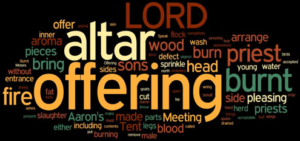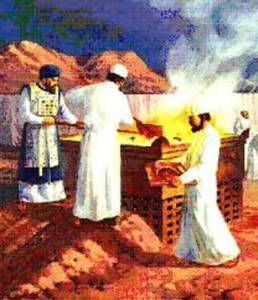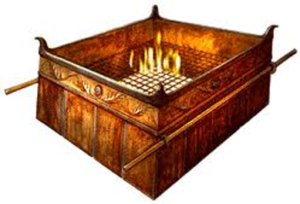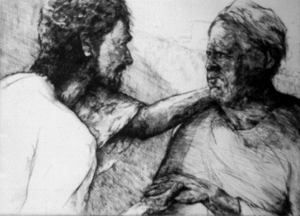TODAY’S HEADLINES:
LEVITICUS- A GOSPEL LOOK OUT POINT
LEVITICUS- THE USER MANUAL FOR THE TABERNACLE
WHAT DO THE SWEET-SMELLING OFFERINGS REMIND YOU OF?
NEW TESTAMENT HEADLINES: JESUS CLAIMS AUTHORITY TO FORGIVE SINS AND EQUALITY WITH GOD
 Attention all fellow hikers of the Bible reading trail: Today we start the Book of Leviticus. Consider it a look-out point. Don’t abandon your progress in reading through the Bible today just because Leviticus does not seem to advance the plot. It is true that the third book in the Bible drops the storyline we have been following in Genesis and Exodus. But the Book of Leviticus gives us a view of God’s holiness that will be needed for the rest of our journey. So fuel up!
Attention all fellow hikers of the Bible reading trail: Today we start the Book of Leviticus. Consider it a look-out point. Don’t abandon your progress in reading through the Bible today just because Leviticus does not seem to advance the plot. It is true that the third book in the Bible drops the storyline we have been following in Genesis and Exodus. But the Book of Leviticus gives us a view of God’s holiness that will be needed for the rest of our journey. So fuel up!
Sadly, some readers jettison the worthy goal of completing their One Year Bible reading when they get to the Book of Leviticus because it reads like a cook book, the back of a medicine bottle, or a foreign dictionary. They quickly dismiss it as being boring, irrelevant, and archaic.
A cookbook is not boring or irrelevant to someone desperately searching for a winning recipe. The instructions printed on the back of a medicine bottle are there for life-saving reasons. Understanding the vocabulary of the country in which you intend to live will help you to understand and communicate necessary information.
The details recorded in the Book of Leviticus are relevant for understanding God’s holiness.
Whereas in the Book of Exodus six chapters contain the BUILDING MANUAL for the Tabernacle (Exodus 25-31:11), the Book of Leviticus contains the USERS’ MANUAL for the Tabernacle.
It’s an intense instruction book. More specifically it is an IN-TENTS instruction book. It tells us about what is required for holiness in the TENT OF THE LORD (The Tabernacle of Worship; Chapters 1-10) and what is required for holiness in the TENT OF OUR LIVES (The Tabernacle of our bodies; Chapters 11-15) and THE TENT OF MEETING (our social lives; Chapters 17-27). We learn that God is holy and we are to be holy. We get a picture of the problem of sin and its effect in our lives. We learn why we need a Savior.
We must not forget what Jesus said about the Books of Moses (Genesis, Exodus, Leviticus, Numbers, and Deuteronomy):
Luke 24:44 (NIV) 44 He said to them, “This is what I told you while I was still with you: Everything must be fulfilled that is written about me in the Law of Moses, the Prophets and the Psalms.”
The writer of the Book of Hebrews explains:
Therefore, when Christ came into the world, he said: “Sacrifice and offering you did not desire, but a body you prepared for me; with burnt offerings and sin offerings you were not pleased. Then I said, ‘Here I am–it is written about me in the scroll– I have come to do your will, O God'” (Hebrews 10:5-7).
The Lord was not pleased with the burnt offerings themselves, but what the burnt offering represented. The burnt offerings prophetically pictured the offering of the body of Jesus Christ on behalf of the unholy. Jesus said, “A body you have prepared for me. It is written of me in the volume of the Book.”
Both the Book of Ezekiel in the Old Testament and the Book of Hebrews in the New Testament build on the foundation of what is written in the Book of Leviticus.
Jesus said to the religious teachers of His day that professed knowledge of the Scriptures but were blind to the fact that the Scriptures were testifying of Himself:
“You diligently study the Scriptures because you think that by them you possess eternal life. These are the Scriptures that testify about me, yet you refuse to come to me to have life.” John 5:39-40 (NIV)
“These are the Scriptures that testify about me,” Jesus said.
Throughout all human history God had Jesus’ sacrifice on the Cross in mind.
John the Baptist announced the Messiah as “the Lamb of God who takes away the sin of the world” (John 1:29). In the last book of the Bible, the Book of Revelation, we read about “the book of life belonging to the Lamb that was slain from the creation of the world.” The sacrificial system decreed at Mt. Sinai becomes a divinely ordained place-holder pointing to the central event of human history, the crucifixion, burial, resurrection and ascension of Jesus Christ, the atoning Lamb of God.
Why was there a need for the Messiah, the Lamb of God who takes away the sin of the world?
Because God is holy. The prophet Habakkuk speaks of Him saying: “Your eyes are too pure to look on evil; you cannot tolerate wrong.” (Habakkuk 1:13). God is perfectly just and true. He does not ignore sin. He is also a God of love and mercy. God’s wisdom ordained from the beginning that His nature of impeccable justice and immeasurable love be satisfied by His becoming a man and reconciling sinners to Himself in the Person of His Son. It would require the Ultimate Sacrifice, something only a holy God/man could accomplish. It would require a Perfect Sacrifice, one of an unblemished, undefiled, perfectly-lived life offered as a Substitute to acquit the guilty. God does not offer forgiveness on an emotional whim. He offers it on the grounds of His love, His righteousness, and His justice.
God instructed that for a certain period of time animals be sacrificed as a substitute for the One True Lamb of God. The perfect sacrifice of Christ would render all other religious sacrifices useless. His would be the once-and-for-all sacrifice (Heb 10:10).
The various sacrifices described in the Book of Leviticus are therefore symbols of the Sacrifice which worshipers could not themselves provide, but would be provided by God in Christ.
The first five chapters of Leviticus describe the five major sacrifices that must be provided to atone for sinful humankind. The first three (the burnt offering, grain offering, and peace offering) are ‘sweet smelling’ sacrifices. These are about the virtues of Christ being brought to the fore to be perpetually remembered on our behalf. The last two sacrifices (the sin and trespass offering) are not sweet-smelling. They represent Christ bearing God’s anger against sin and fulfilling law that demands its death penalty. These sacrifices demonstrate that God hates the principle of sin that is at work in mankind. Sins and trespasses must be, and will be, put away and perpetually forgotten when Jesus becomes our sin offering on the cross.
The first three chapters focus on the sweet-smelling sacrifices. A pleasant smell brings something pleasant to mind. When you smell fresh bread it may trigger a pleasant associated memory or an anticipation for a pleasant meal. Sweet-smelling sacrifices speak of that which is received by God as being worthily memorable and pleasant. The good news is that these positive virtues represented by the first three offerings are something that reminds God of the Son in whom He is well-pleased! The ‘sweet smelling sacrifices’ represent the all-satisfying righteousness of Christ offered on our behalf. His righteous life is given in place of our unrighteous life. His offering is a propitiation, a theological term denoting that it is fully satisfying to God’s sensibilities. He does this that we might be accepted rather than rejected. Through Jesus offering Himself in our place before God, His satisfying virtues are credited to us. God made Christ to be our perfect solution (Wisdom)- our righteousness, sanctification and redemption (1 Corinthians 1:30).
All of the sacrifices are made by fire. The fire is a symbol of God’s presence (Deuteronomy 4:24) and the fire for the tabernacle sacrifices actually came from the Lord.
Leviticus 9:24 24 Then fire came out from before the LORD and consumed the burnt offering and the portions of fat on the altar; and when all the people saw it, they shouted and fell on their faces.
The fire brings out the fragrance of the sweet-smelling burnt, meal and peace offering and destroys the smell of the sin and trespass offering. The fire must be maintained and never go out (Lev. 6:13).
LEVITICUS CHAPTER 1- THE BURNT OFFERING- PERFECT DEVOTION UNTO THE FATHER
In chapter 1- Jesus is our burnt offering representing full, perfect devotion to God. Hands are laid on the head of the animal speaking of the animal’s identification with the people and the people with the animal. The burnt offering must be a male “without blemish (Lev 1:3); fully surrendered to make us acceptable to God (1:4). Every part of the body is used (1:9). It is a picture of full consecration that is pleasing to the Lord (1:9).
LEVITICUS CHAPTER 2- THE MEAL OFFERING- SANCTIFICATION AND SERVICE FOR THE SAKE OF OTHERS
In Chapter 2 Jesus is the fulfillment of the grain offering.
Jesus said, “ I tell you the truth, unless a kernel of wheat falls to the ground and dies, it remains only a single seed. But if it dies, it produces many seeds” (John 12:24).
Jesus was speaking about the necessity of His death in order that righteousness be reproduced and many sons be brought into glory.
The burnt offering speaks of Christ’s personal consecration to God. The grain offering speaks of Christ consecrating Himself to God for the benefit of others (John 17:19). The grain of this offering was planted, cultivated, harvested, broken down and prepared by the hands of men. The grain is pounded into a fine flour, ground often with a hammering or grinding object against a stone. This speaks of Jesus’ humble submission that led to His obedience to death on the cross on our behalf.
Whereas the burnt offering was to be without blemish (1:3) the grain offering was to be “without leaven” (2:11). Leaven sets up the work of disintegration; it is a corrupting influence. Jesus warned his disciples to “beware of the leaven of the Pharisees” (Matt 16:6). The leaven of the Pharisees was hypocrisy. The leaven of the Sadducees was rationalism. The leaven of the Herodians was worldliness and materialism. Paul taught that the leaven that needs to be thoroughly purged from our hearts is the leaven of “malice and wickedness” (1 Corinthians 5:8).
The grain offering was to be “without honey”. Honey ferments. Natural sweetness and human sentimentality, based on affections that fall short of valuing the things of God over and above the things of men, are corrupting influences (Matt 16:22-23). None of these things were mixed into the motivations of Christ’s humanity.
The meal offering must be offered “with salt”. Salt was a precious commodity in the Mid-East. We get the word ‘salary’ from salt. You hear people say, “they are not worth their salt”. This is because salt was used as a premium item for trade. Salt savors, stops the spread of corruption, and makes you thirsty. All of these catalytic qualities are found in Christ.
The meal offering was offered with oil (representing the anointing of the Holy Spirit) and frankincense, another ingredient that provided for its sweet fragrance.
LEVITICUS CHAPTER 3- THE PEACE OFFERING- FELLOWSHIP WITH GOD
This is another animal sacrifice ‘without blemish’. Whereas the burnt offering was gender specific, a male; the peace offering could be male or female. The burnt offering could be a bull or a bird; the peace offering could not be a bird. Hands are laid on the head of the animal speaking of the animal’s identification with the people and the people with the animal. It is a food offering as well as a sweet-smelling offering. The offerors could not partake of the burnt offering. They could and did partake of peace offering. They could eat it on the day it was sacrificed, or the day after, but not on the third day (Lev 19:5-8).
An Israelite could not slaughter an animal for eating without bringing it first to the Tabernacle for a Peace Offering. There can be no partaking of fellowship apart from the Peace Offering (Christ).
Leviticus 17:3-4 (NIV) 3 Any Israelite who sacrifices an ox, a lamb or a goat in the camp or outside of it 4 instead of bringing it to the entrance to the Tent of Meeting to present it as an offering to the LORD in front of the tabernacle of the LORD–that man shall be considered guilty of bloodshed; he has shed blood and must be cut off from his people.
This reminds us that there is no spiritual fellowship with the Father, the Spirit, or our brothers and sisters apart from Christ.
THE GOSPEL OF MARK 1:29-2:12
After the synagogue service, Jesus stops at Peter’s mother-in-law’s house in Capernaum. (Yes, Peter had a wife!) Jesus healed her of her debilitating fever. He simply took her by the hand and the fever was dispersed and Peter’s mother-in-law was on her feet serving them!
Jesus healed many sick people and cast out many demons. He forbade the demons to speak. Jesus knew that demons and unregenerate people are not reliable testimonies in that they may speak of aspects of the truth, but they do not know the gospel.
Notice Jesus’ habit of early morning prayer (Mark 1:35). He knew where to go for His daily marching orders. He kept His God-given commission in view (1:38).
Jesus is both willing and able to heal the leper. Leprosy is a type of sin (as we will see in the Book of Leviticus). Jesus is willing and able to deal with what none other can.
Again, Jesus tells the healed leper to say nothing to anyone but to go to the priest to be pronounced clean there. Until the resurrection, the gospel is not yet understood and the leper must fulfill the responsibilities of the law as given in Leviticus. Nevertheless, the man began to speak and, in general, Jesus was not able to enter cities publicly any longer. (Mark 1:45)
The healing of the paralytic reminds us that sometimes people cannot come to Jesus without help from their friends. And of course, this healing makes it clear that the forgiveness of sin, which God alone can provide, is something that Jesus demonstrated that He can do, thereby claiming equality with God (Mark 2:10-11).
Mark 2:10-11 10 “But so that you may know that the Son of Man has authority on earth to forgive sins”—He *said to the paralytic, 11 “I say to you, get up, pick up your pallet and go home.”
TODAY’S READING FROM THE BOOK OF PSALMS: Psalm 35:17-28
This is the conclusion of the imprecatory psalm where the Psalmist is wanting to see judgment fall on his perceived enemies. 
Psalm 35:26 26 Let those be ashamed and humiliated altogether who rejoice at my distress; Let those be clothed with shame and dishonor who magnify themselves over me.
We can sense the Psalmist is suffering prolonged opposition and abuse.
Psalm 35:17 17 Lord, how long will You look on? Rescue my soul from their ravages, My only life from the lions.
Yet he appeals to God’s righteousness (v. 24, 28) and concludes the Psalm in the spirit of thanksgiving.
Psalm 35:18, 28 18 I will give You thanks in the great congregation; I will praise You among a mighty throng. …… 28 And my tongue shall declare Your righteousness And Your praise all day long.
TODAY’S READING FROM THE BOOK OF PROVERBS: Proverbs 9:13-18
The Book of Proverbs personifies Wisdom and Folly as two women. Personification is a literary device to show how these abstract qualities of wisdom and foolishness act upon our lives. Do we listen to advice that is boisterous, but not truly sound? Is our attention grabbed by “in your face” advertising and do we allow ourselves to be persuaded by her idle claims?
Foolishness and naivety pay heed to the false promise that you can get away with sin and keep it a secret. Advertisers and tempters don’t let you know that death and hell are certain side effects of departing from God’s way!
Proverbs 9:13-18 13 The woman of folly is boisterous, She is naive and knows nothing. 14 She sits at the doorway of her house, On a seat by the high places of the city, 15 Calling to those who pass by, Who are making their paths straight: 16 “Whoever is naive, let him turn in here,” And to him who lacks understanding she says, 17 “Stolen water is sweet; And bread eaten in secret is pleasant.” 18 But he does not know that the dead are there, That her guests are in the depths of Sheol.
PRAY FOR AFGHANISTAN
Afghanistan is one of the least reached countries in the world. There are 48,000 mosques but not a single church building. Pray for the 70 unreached peoples of this land, especially for the following groups:
- a)They number over 40% of the Afghan population and are politically dominant. Pashtun on both sides of the Afghanistan-Pakistan border comprise what has been called the largest Muslim tribal society in the world – as many as 46 million people in over 30 major sub-tribes. Christians among them remain few, though urban, educated Pashtuns in exile have shown some response. Pray that multitudes might be released from fear, prejudice, the strongholds of Islam and pride in pashtunwali (their tribal code of honor); there is evidence of an intense spiritual battle for breakthrough among this people.
- b) Tajiks in the northeast. Speaking Dari (a form of Persian), they are closely related to the Pashtuns. Some Tajik groups were among the last people to resist the Taliban, yet they remain over 99% Muslim. Pray for their spiritual freedom.
- c) Hazaras, Shi’a Muslims of Mongol descent. Being a Shi’a group, they have been severely persecuted through the years and were even massacred by the Sunni Taliban. They have demonstrated greater openness to the gospel in recent years.
- d) Uzbeks and Turkmen of the north have shown encouraging responsiveness as refugees in other lands, but as in their namesake countries, only a tiny proportion are believers.
- e) The six Aimaq tribes of the west, of nomadic background, and the Baloch and Brahui of the south. There are very few if any believers from these isolated groups.
- f) The nine Nuristani tribal groups in the mountains north and east of Kabul. They speak five languages and 16 dialects; many of these are mutually unintelligible.
- g) The five Ismaili Muslim Pamir people groups and the Kyrgyz living in the far northeast of Afghanistan, along the high Pamir Mountain range. These people groups are isolated in small valleys, far from good roads. Ismaili Muslims tend to be more open to the good news, and a small community of believers was birthed some years ago. Praise God for good distribution of gospel audio materials among the Kyrgyz.
- h) The numerous Dardic people groupsnear the volatile border region with Pakistan. The largest of these is the Pashai, numbering in the hundreds of thousands of people.
- i) The nomadic Gujar and Jugi/Kuchi/Ghorbat people groups.
PRAYER: Thank you. LORD, for Your Word. We rejoice in the holy devotion of Christ who loved us and gave Himself completely as our burnt offering; His selfless setting Himself apart for us in humble submission as our meal offering, in order that we might be a partaker of His nature; and His representation of us before You as our peace offering that we might enjoy fellowship before You in one spirit! Thank You for the User’s Manual of Leviticus that teaches us that the perfections of Christ give us bold access into Your Presence. Help us not to receive this grace in vain, but draw near to You with the full assurance of faith in the gospel!
Father, You have revealed to us that Jesus is Your Perfect Communication and has the power to forgive sins. May we be faithful to testify to the truth about Him! Fill us with Your Holy Spirit that we may declare His righteousness and praise all day long! In Jesus’ Name we ask it! Amen
-Pastor David
